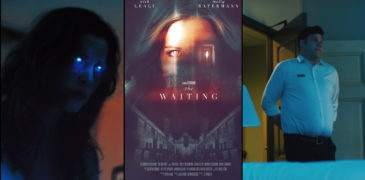
1996’s Scream was a game-changer for the slasher genre. By playing with well-established conventions, the movie directly engaged the audience in a conversation about what they were watching and toyed with their expectations. This self-aware approach rejuvenated the slasher for critics and public alike, summoning a tidal wave of copycat films. This meta approach became standard for the neo-slashers, the subgenre Scream and its followers would live under.
Quick to realize they were standing on the shore of an ocean of money, filmmakers and studios began looking for projects to ride the wave that Scream had created. Writer Ken Selden and director Geoffrey Wright hoped their own neo-slasher, Cherry Falls, would take the genre even further by combining teen-sex comedy hijinks with gruesome murders, think Porky’s, but taking place at Camp Crystal Lake. They hoped mixing the two at a giant, school-wide orgy, would make Cherry Falls a winner.
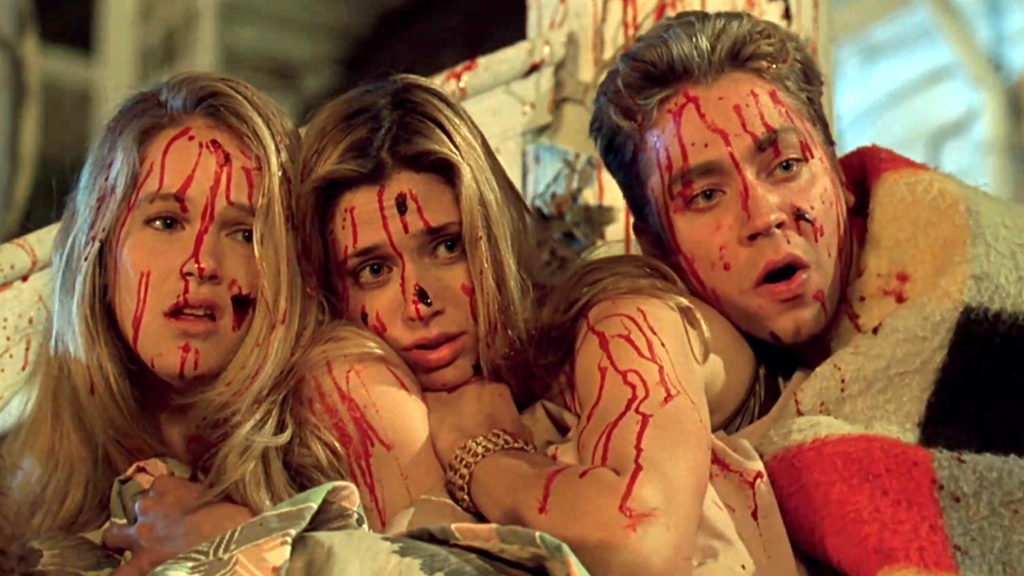
Abruptly, the tide of public opinion turned, creating an undertow that forced unwelcome changes on the newly completed film. In 1999, after a series of violent crimes linked to the original Scream and the horrific Columbine High School Massacre, parents began clamoring for changes in the movie rating system to diminish teenage access to violent content. Because of this outcry, the Senate investigations they created, and the MPAA’s unwillingness to give the movie an R-rating, USA Films, Cherry Falls’s distributor, removed much of the sex, violence and gore from the final film, reducing it to made-for-TV levels.
A serial killer is stalking the high school students in the town of Cherry Falls, brutally murdering them and fashioning gruesome tableaus out of the bodies. When word gets out that the killer is only targeting virgins, the students of Cherry Falls High School plan a party to lose their virginity en masse to save their own lives. After surviving an attack by the killer, Jody Marken (Brittany Murphy) daughter the town sheriff (Michael Biehn), suspects that her father and his friend, school principal Tom Sisler (Joe Inscoe), know more about the murders than they are admitting. The killer chases Jody to the party where are they struggle again and she throws the killer out a second-story window.
There are a lot of great things to like about this movie! As the final girl, Brittany Murphy’s performance is easily the best part of the movie. She brings a chaotic enthusiasm to the role of a character who, while stuck in the odd space between childhood and adulthood, projects an integrity and feistiness that stands out from the murky morals and motives of her peers and the surrounding adults. Her transformation to the final girl is unique and belongs to her alone.
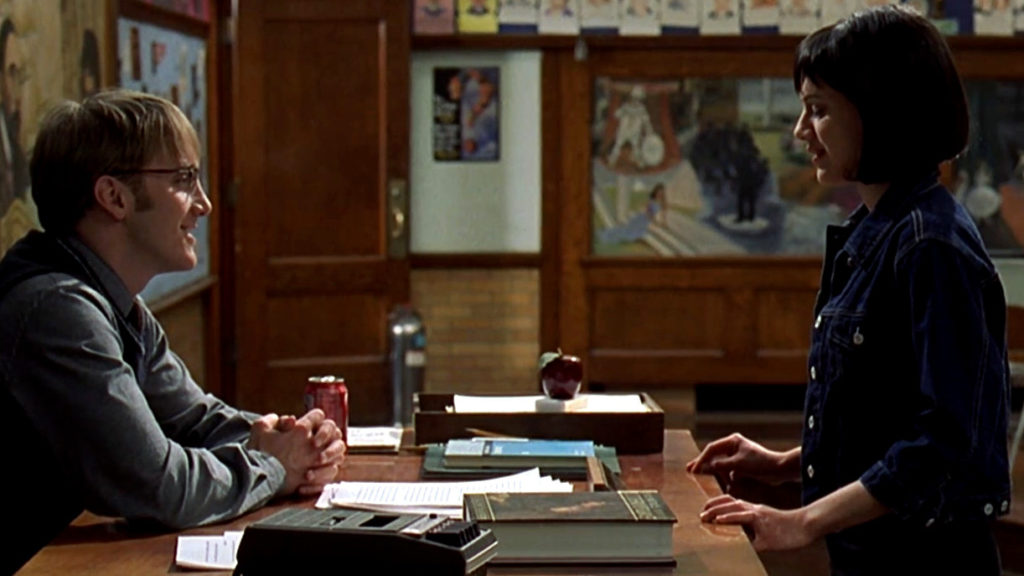
Besides reversing the prohibition against teenagers having sex, Cherry Falls refashioned the Jody into an unusual final girl. While she toys with the idea of losing her virginity, she consistently remains firm that it is her decision to make and will not be pressured either way by her parents, her boyfriend, or even the killer. Selden and Wright’s approach to the transformation of the final girl differs from the typical changes she makes. In older slashers, the weapons used take on highly symbolic significance. Critics and film theorists have written plenty about the subtextual significance of the final girl picking up her own, penetrative weapon. It stands in for castration of the killer and theft of his penis, turning her into a male figure. In Cherry Falls, Jody defeats the killer not by stabbing him, but by throwing him out a window. She never picks up a weapon, relying on hand-to-hand combat lessons taught to her by her father. In short, she avoids becoming what Carol Clover said is “the male viewer’s use of her (the final girl) as a vehicle for his own sadomasochistic fantasies.” (Men, women, and Chain Saws, 1992, page 54) The only other final girl that comes close to avoiding this transformation is Nancy from Wes Craven’s Nightmare on Elm Street (1984). She defeats the killer, at least in the first film, by losing her fear of him and therefore rendering him powerless.
Besides fighting for the lives of her peers, Jody also struggles with the secretive and hypocritical nature of the adults. Her investigation reveals that her father, the sheriff, Principal Sisler, and her English teacher (Jay Mohr) are complicit in the crimes and the killer’s origin. Because of the principal’s discomfort with the concept of sexually active teens, he argues to withhold the nature of the killings from the public, appearing to favor the deaths of his students over a frank discussion about the dangers of remaining a virgin.
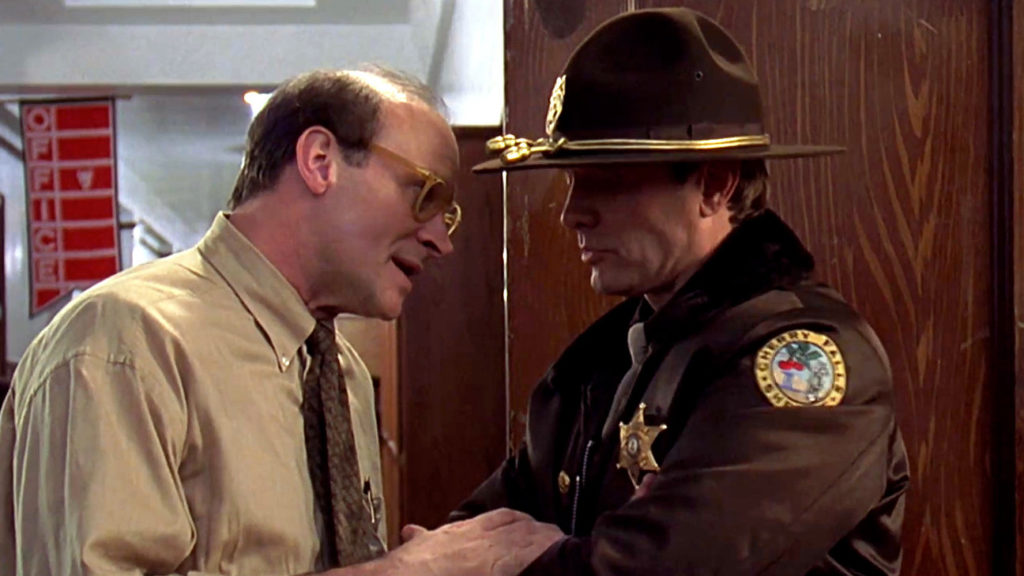
Because the MPAA would not give Cherry Falls an R-rating, and USA Films wasn’t willing to release it with an NC-17 or X rating, the film underwent severe cuts to remove naked bodies and blood. Unfortunately, these changes deprived the audience of the visceral thrill they had expected and made for a weaker film. Ironically, this willingness to conform to public pressure is the opposite of Jody’s refusal to give into peer pressure.
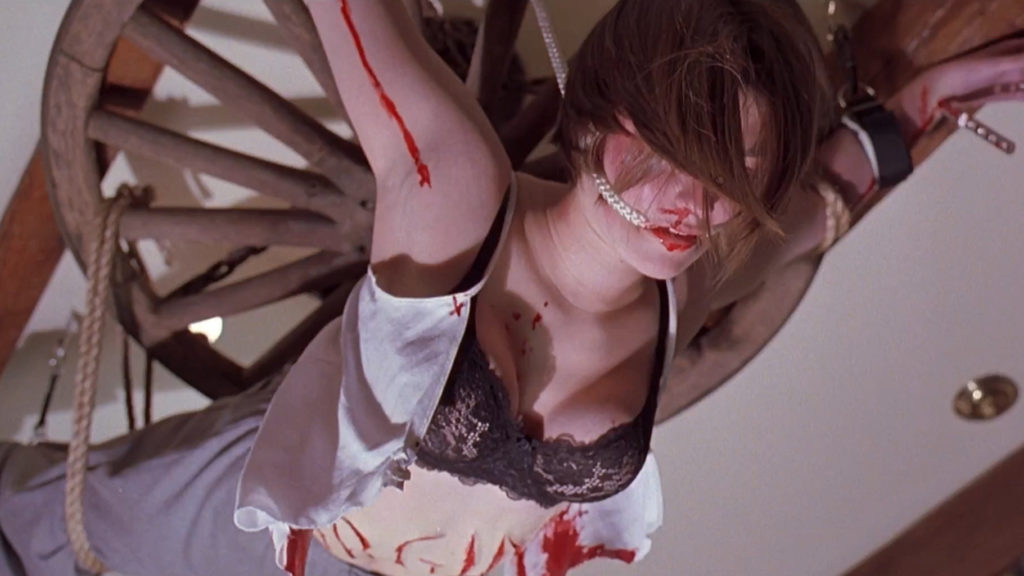
Made during a renaissance for slasher films, Cherry Falls was, if not a game-changer, at least it was an example of the new ways the genre was defining itself. Reversing the sex-taboo made room for new conversations about gender and sexuality. Also, unlike the final girls before her, Jody’s journey more closely resembled the hero’s journey with her ending as a stronger and wiser version of herself, as opposed to previous final girls whose journeys left them damaged, shaken, and often still vulnerable Into the next film, Halloween’s Laurie Strode and Scream’s own Sidney Prescott notwithstanding. This gives Cherry Falls an unexpected heart and soul that speaks to the difficulty of transitioning from childhood into adulthood.
More Film Reviews
Looking to make some extra cash, Dom is pressured into smuggling drugs over the border. With his friend and aspiring gay porn star Benjamin along for the journey, the night… We’re Not Here to Fuck Spiders is a 2020 Australian found footage horror movie written and directed by Josh Reed, who is primarily recognized for his directing work on television… Take a group of unhappy people, add a ghost, and plenty of bad life advice, and the result may look something like F. C. Rabbath’s 2020 film, The Waiting. Billed… The exorcism subgenre can be a bit of a double-edged sword. It’s so easy to rely on cheap makeup effects and jump scares to quickly turn a profit, which is… Less based on and more inspired by themes of obsession explored in the acclaimed book of the same name by Kobo Abe, The Box Man (2024) marks the return of… Known as one of the most gruesome series of Japanese rape-revenge and torture films ever made, the All Night Long Series has long been associated with a sense of infamy….Swallowed (2022) Film Review – Don’t Worry, It is Worse Coming Out Than it is Going In
We’re Not Here to Fuck Spiders (2020) Film Review – Found Footage from Down Under
The Waiting (2020) Film Review – An Unexpectantly Grim Tale of Haunted Hotels and Supernatural Romance
The Exorcism of God (2021) Film Review – Tough Questions Require an Exorcist
The Box Man (2024) Film Review – True Freedom Comes from Embracing the Box
All Night Long Hexalogy (1992-2009) – Nihilism in Art
I am a lifelong lover of horror who delights in the uncanny and occasionally writes about it. My writing has appeared at DIS/MEMBER and in Grim magazine. I am also in charge of programming at WIWLN’s Insomniac Theater, the Internet’s oldest horror movie blog written by me. The best time to reach me is before dawn.


